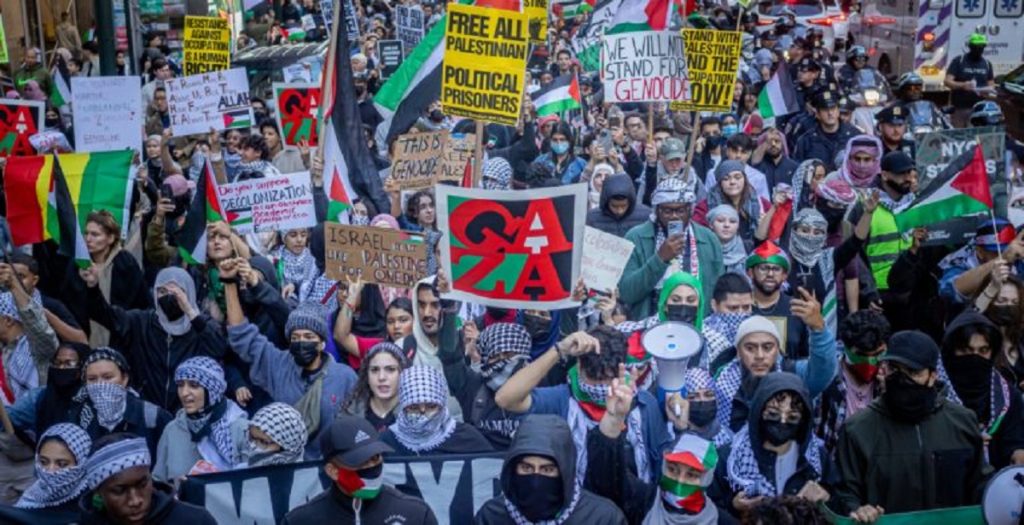Watan-U.S. Secretary of State Marco Rubio has reportedly ordered American diplomats to inspect students’ social media posts before granting them visas. This move comes as President Trump expands deportation efforts, including the deportation of students who expressed support for Palestinians during Israel’s war on Gaza.
According to a report by Edward Wong, Rubio instructed U.S. diplomats abroad to scrutinize the social media accounts of students applying for study and other types of visas in order to identify those who criticize Israel or the U.S. before approving their applications.
Rubio issued these guidelines in a lengthy diplomatic cable sent to U.S. embassies around the world. This step followed Trump’s executive orders, signed nine weeks earlier, to launch a campaign targeting certain foreign nationals, including those who may hold “hostile attitudes” toward “American citizens, culture, government, institutions, or founding principles.” Another executive order launched a crackdown on what Trump called antisemitism, which includes deporting foreign students who participated in campus protests against Israel’s war on Gaza.

Rubio Orders Mandatory Social Media Checks for Visa Applicants
Rubio’s directive states that, starting immediately, consular officers must refer certain student and exchange visa applicants to the “Fraud Prevention Unit” for a “mandatory social media screening,” according to U.S. officials familiar with the cable.
The Fraud Prevention Unit, part of the consular affairs section at embassies and consulates, helps in vetting visa applications. The cable outlines general criteria for diplomats to use when deciding to deny a visa. It references Rubio’s remarks in a CBS News interview on March 16, where he said: “We don’t want people in our country who commit crimes and undermine our national security or public safety.” He added, “It’s that simple, especially for people who are here as guests. That’s the essence of a visa.”
The cable specifies the types of applicants whose social media should be reviewed: individuals suspected of having links or sympathies with terrorism, those who applied for student or exchange visas between October 7, 2023, and August 31, 2024, or anyone whose visa was revoked since October 2023 — the month Hamas attacked Israel.
The set date in Rubio’s cable suggests the primary purpose of the social media checks is to deny visas to students who expressed solidarity with Palestinians during the war. The cable also states that visa applications may be denied if an applicant’s behavior or actions show a “hostile attitude toward American citizens or culture, including the government, institutions, or founding principles.”
Rubio Pushes for Visa Revocations Over Online Speech
This language could prompt foreign nationals to self-censor various types of expression to avoid jeopardizing their visa chances. American consular staff may also struggle to evaluate past statements or social media posts accurately, especially without the proper cultural or political context.
The report notes that a likely goal of the cable is to deter some applicants from completing their visa requests — a result Rubio reportedly favors.
The cable detailed the student visa types (F, M, and J) that may require additional scrutiny. The directive was first reported by the independent news site “The Handbasket.” A State Department spokesperson declined to comment on internal deliberations but noted that in 2019, the department modified visa application forms to include questions about social media accounts.
On Tuesday, former Costa Rican President Oscar Arias told reporters that the U.S. government emailed him, stating it was suspending the visa in his passport that previously allowed him to enter the United States.
A few weeks earlier, Arias had posted on social media calling Trump “a Roman emperor.” Arias, a Nobel Peace Prize laureate, is so far the most prominent foreign national to have his visa revoked. The cable stated: “The standard is: if we had known this information before granting the visa, would we still have issued it?” It adds: “If the answer is no, then we cancel the visa.”
That same day, Rubio told a reporter that the students “have gone beyond protest — they’re going out and causing disturbances. They’re basically inciting riots on campus,” and added: “Every single one I find, I’ll deport.”
Rubio Targets Foreign Students for Deportation Over Speech
In a mid-March email, a State Department spokesperson said that “all available technologies” are being used to screen visa applicants and holders. This was in response to a question about whether the department is using AI to scan databases and social media posts to identify individuals the Trump team believes should have their visas revoked.
After issuing cancellation letters, Rubio sends them to the Department of Homeland Security. The department has reportedly deployed agents to detain some foreign nationals whose visas or even permanent residency — green card status — have been revoked.
In early March, Rubio informed Homeland Security that he had canceled the residency of Mahmoud Khalil, a lawful permanent resident, and the visa of 21-year-old Korean student Eunice Chang, who has lived in the U.S. since age 7 and studies at Columbia University.
Rubio based his decisions on a legal provision allowing him to recommend the deportation of any person posing a “serious and potential threat to U.S. foreign policy.”
Khalil is married to a U.S. citizen. Last week, six federal agents dressed in black, some masked, abducted Turkish student Remisa Öztürk off a street in Somerville, Massachusetts, and took her to a detention center. Rubio later announced that he had revoked her student visa. Öztürk had co-authored a student newspaper article last year calling on universities to support Palestinian rights and divest from Israel.
Rubio said last Thursday: “I hope we finish at some point — because we got rid of them all. But we’re searching every day for these lunatics who are destabilizing the country,” and added, “I encourage every country to do the same, by the way, because I think it’s insane to invite students into your country who come onto your campuses and destabilize them.”
